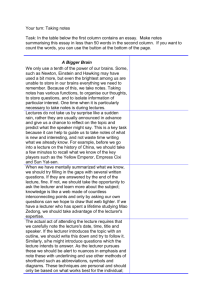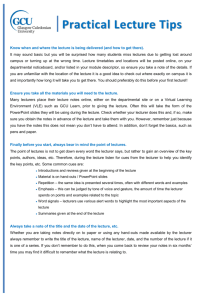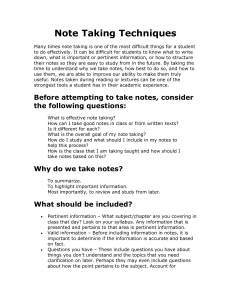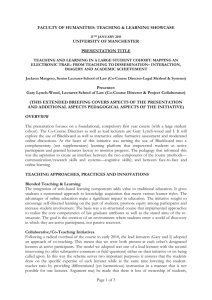Information for Lecturers
advertisement
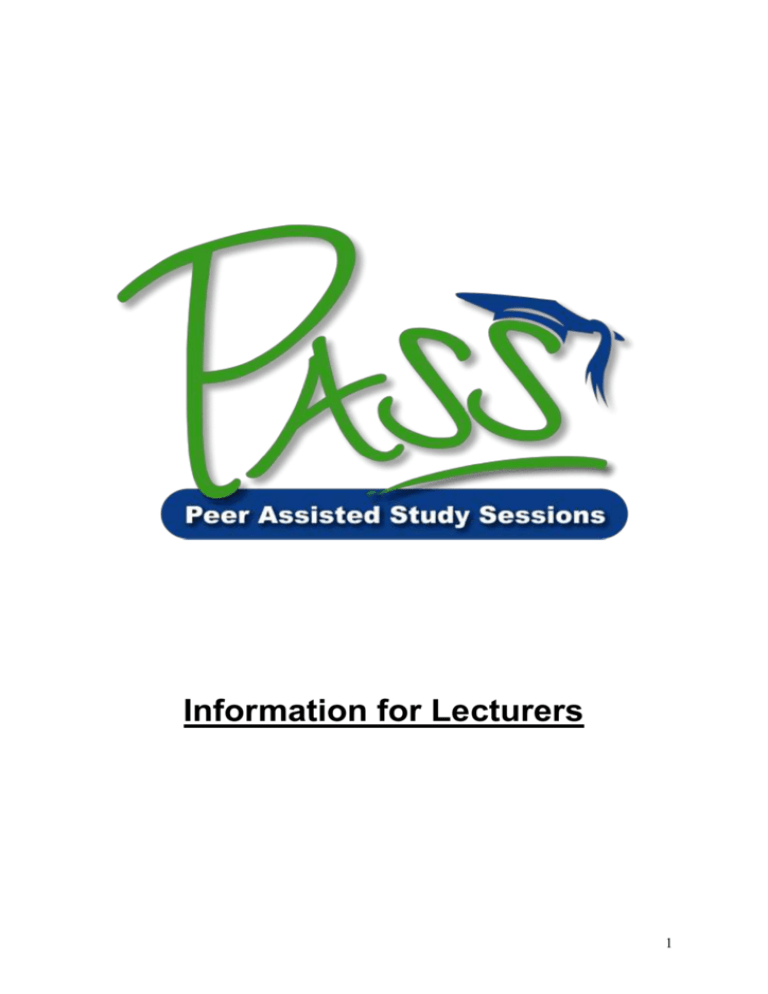
Information for Lecturers 1 PASS PROGRAM LECTURER GUIDE What is PASS? Peer Assisted Study Sessions or PASS is a voluntary academic assistance program that utilises peer-led group study to help students succeed in traditionally difficult subjects— those with high unsuccessful completion rates (F and FW). PASS targets tough courses which over time have demonstrated their difficulty regardless of the staff who teach them or the material that is used. These subjects are difficult for many students, with some struggling more than others and, as such, are deemed “high risk”. At CSU and other institutions, PASS is also sometimes attached to subjects for other reasons, such as the establishment of learning communities or the development of discipline-specific academic/learning skills. The PASS sessions are facilitated by PASS Peer Leaders, students who have previously completed the targeted subject and have demonstrated strong competency. The PASS sessions can be best described as “super group learning” wherein the PASS Leader facilitates group study strategies / activities and collaborative study techniques specific to the subject. PASS and tutorials can differ greatly. Whereas tutorials typically cover a set of work and assessments indicated in the subject outline, each PASS session has an agenda determined by the PASS Leader and the attending students that week. Each week, PASS Leaders offer regularly scheduled PASS sessions which are held on campus. PASS Leaders promote their sessions as “guaranteed study time” because by attending PASS, students have an opportunity to meet with classmates outside of class and engage themselves in the course material. During a typical PASS session, students compare and clarify lecture notes, review textbook readings, and discuss key course concepts. PASS also provides an opportunity to complete study activities while developing study skills specific to the course. While it is important to know exactly what PASS is, it is equally important to understand that PASS is not a remedial program for three important reasons: 1) PASS supports high-risk subjects rather than just high-risk students 2) All students enrolled in a targeted subject are encouraged to attend PASS—not just those struggling. PASS therefore avoids any remedial stigma. 3) PASS usually starts in week 2 and continues to the end of the term Purpose PASS has multiple purposes which include: 1) 2) 3) 4) Reducing rates of attrition within targeted subjects Improving student grades in targeted subjects Increasing the graduation rates of students Assisting students to make a successful transition to tertiary study and life at university 5) Development of transferable study skills and independent learners 2 PASS PROGRAM LECTURER GUIDE The PASS Model and Basic Design The PASS Model involves the following key persons: 1) PASS Program Manager—a trained professional responsible for the management of the program, liaising with faculty staff, selecting, training and supervising the PASS Leaders and evaluating the program. 2) Academics—lecturers from identified targeted courses. Lecturers also reinforce PASS Program support, advocating this academic assistance to all students. 3) PASS Leaders—students deemed course competent, and trained in proactive learning and study skills strategies. A key component of the PASS Model is utilisation of peer students (as opposed to subject tutors) for this position; doing so negates possible inference linking PASS with final course grading 4) Students—the voluntary participants in the PASS sessions and—although mentioned last—the most crucial component of PASS. Source: UMKC Training Material Role of the PASS Leader PASS Leaders serve as peer facilitators for PASS sessions. This role requires PASS Leaders to attend half the lectures on the targeted subject to ensure constant and consistent knowledge of the lecturer’s expectations and subject content. The PASS Leader’s role in the classroom is to model effective classroom behavior and then transfer that knowledge to the PASS session. To form the basis of their PASS sessions, PASS Leaders combine specific study skills with key course content, integrating what to learn with how to learn. Moreover, the PASS Leader knows which successful strategies will facilitate all of these things. In turn, the PASS Leader will pass on his/her “know how” to students in the class so they can be successful as well. PASS Leaders undergo an intensive 2 day training before commencing their role, have regular observations by staff who offer supportive feedback and undertake further professional development activities throughout the semester. 3 PASS PROGRAM LECTURER GUIDE How is PASS Helpful? PASS is helpful in many ways, but students often comment that it: 1) 2) 3) 4) Provides guaranteed study time Offers a relaxed, “non-threatening” learning environment Creates a smaller, more comfortable-sized study setting Facilitates discipline based social interaction and networking Lecturer Expectations For PASS to achieve its highest potential effectiveness, we ask lecturers to provide assistance in a few areas Make announcements about PASS (lectures, subject outline, e-learning space) Post the PASS session schedule on your subject’s Bathurst Internal forum PASS prompts from lecturers remind students of its availability and encourage participation in a positive manner. It should always be stressed that ALL students are encouraged to attend. How a PASS Leader can differ from a traditional tutor PASS Leaders can be different from tutors in a number of categories. The chart below emphasises these differences and helps to explain why it’s important to maintain this key element of the PASS Model, which dictates use of peer students as PASS Leaders. PASS Leader Tutor Characteristic Model student Content specialist Status Peer Academic elite Goal Helps students to be successful Sometimes teaches subject matter only. Mode Group participation/ Collaborative Learning Sometimes a more passive learning environment Orientation Student-oriented Lecturer-Oriented Instructional Duties Leads group—Leaves teaching to lecturer Re-lectures or re-teaches group. Also grades assessable tasks 4 PASS PROGRAM LECTURER GUIDE Typical Lecturer Concerns Why my subject? PASS typically supports 100- and 200-level introductory, core curriculum, or “gatekeeper” courses. PASS is part of your class for several reasons, none of which have anything to do with your ability to teach. The primary reason is usually because this class is a historically difficult course wherein many students struggle and fail, thus producing a high failure and withdrawal rate for the course. Rest assured you have not been singled out because someone out there thinks you need support. The focus of PASS is the difficulty inherent within the subject itself and/or acquiring discipline specific learning skills. How much work will it be for me to have PASS support? PASS is completely maintained and coordinated through the Transition Project. All we ask of lecturers in PASS-supported classes is that they provide the following: A few minutes at the beginning of lectures for the PASS Leader to make announcements when needed Time to meet briefly with the PASS Leaders, if possible, allowing them to keep you informed of what’s happening in the PASS sessions. At the lecturer’s request, Leaders can also provide very valuable and early feedback on concepts students are struggling with. Will I have to change my teaching style? No! PASS attempts to help students learn how to be successful in the course, regardless of the way you teach. It is not our intention to dictate how you should teach your class. PASS will support your teaching. Will PASS Leaders just help students complete their homework or assignments? Absolutely NOT! PASS Leaders do not facilitate the study groups so students can complete homework together, write group papers, or complete take-home exams. On the contrary, the purpose of PASS is to help students become successful and independent learners. By doing their work for them, PASS Leaders would run the risk of making the students believe that it is not necessary for them to understand the work or how to go about completing their assignments. Instead, PASS Leaders may discuss typical problems, create new problems, or work problems that were not assigned. PASS Leaders may discuss how to organise material, how to prepare for assignments or exams, and how to develop problem-solving abilities. What goes on during PASS sessions? A typical PASS session is an hour-long meeting in a classroom on campus and might include a review of lecture and assigned readings, group work and discussion, problem-solving and critical thinking activities, or a mock exam. The PASS Leader’s primary focus is to assist students in understanding the course material while helping them to develop effective study skills that are applicable to the content. The PASS Leaders will never structure PASS sessions as a forum to re-lecture to students who missed lectures. Indeed, Leaders regularly emphasise to students how important it is to attend lectures and tutorials. 5 PASS PROGRAM LECTURER GUIDE How can students find PASS sessions? PASS is primarily promoted in the subjects that it supports. The four main ways students can find PASS sessions are: 1. Through PASS Leader presentation in week 1 lectures 2. Through the supported subject’s Bathurst Internal forum. 3. Through advertisements and recommendations made by lecturers and tutors. 4. Students can also e-mail pass@csu.edu.au to find a session. Is the PASS Program interested in PASS Leader referrals? Absolutely! We use a variety of publicity methods to attract qualified students for PASS Leader positions, and we welcome lecturer suggestions. PASS History PASS is based on Supplemental Instruction (SI), the brainchild of Dr. Deanna Martin from the University of Missouri - Kansas City (UMKC). In 1973 Dr. Martin developed the SI Model in response to her university’s concern regarding the high failure rate among minorities in medical school. The program quickly spread to UMKC’s health and professional schools and soon after that throughout the entire university. By 1981 the U.S. Department of Education named Supplemental Instruction an Exemplary Education Program. Very few post-secondary programs hold such a distinction. Today, over 1800 institutions in the United States and 27 countries have implemented SI / PASS on their campuses. PASS in Australia Since 2005, the UOW PASS Program has been accredited by UMKC as the National Centre for PASS/SI in Australia. The National Centre offers support to PASS Programs in the Australasian region. Over 200 staff from nearly 35 institutions in Australia, NZ, Fiji, Malaysia and Hong Kong have been trained by the National Centre for PASS since 2005. PASS operates at a range of institutions including the University of Sydney and University of Melbourne. What should I do if I have any concerns about a PASS Leader or the PASS Program? Immediately contact the PASS Coordinator Peter Greening on (02) 6338 4302 or pgreening@csu.edu.au. This resource is based on resources from the National PASS Office at the University of Wollongong and Angelo State University, Texas. Resources have been modified and used with permission. 6

